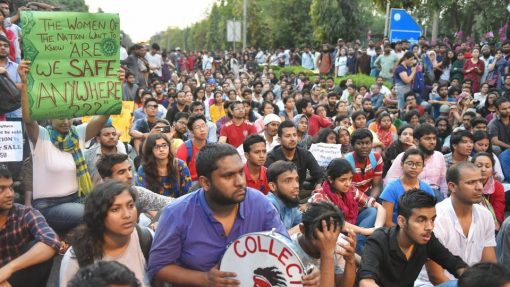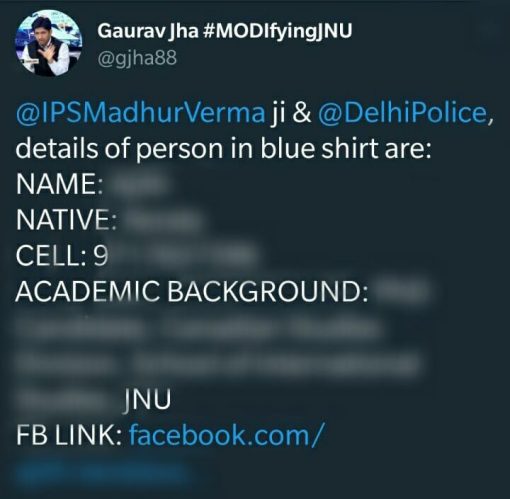
I do not believe that my personal background should be the centre of discussion when engaging politically with anyone for any cause. But when all facets of my identity, including my personal details, are exposed and mocked by the Sangh Parivar, I believe that my reply should also focus on the individual that I am and the social background that I belong to.
On 23 March, a Long March was organised jointly by the Jawaharlal Nehru University Students' Union (JNUSU) and the Jawaharlal Nehru University Teachers Association (JNUTA) from JNU to Parliament Street. In the very peaceful march of about 1,000 people, we walked on the busy roads of Delhi for more than seven kilometres without disturbing the traffic or the common people at any instance, while carefully following the police’s instructions.
I joined the march, like the hundreds of others, with a conviction that we are marching for a genuine cause.
There was an immense longing for justice, apart from saving the very existence of our university.
Mid-way, on a lonely road, near Lake Park we were stopped by the Delhi Police and brutally lathi-charged without any provocation. The police was actually betraying us by leading the march to an enclosed lonely place to unleash violence upon us. Their intention was clear– to trap us into a lonely place and thrash us.
The heinous nature of their violence, especially towards female students is common knowledge now. Even journalists were not spared.
The Delhi Police was later forced to apologise to the journalist for their act wherein they gave a bizarre statement that they mistook the journalist for a student and hence beat her up.
The very statement shows how the police had decided to deal with the students on the said day.
Due to the public anger generated against their mayhem, on the following day, the police uploaded some selective videos on Twitter, completely overlooking others which showed their barbarity.
I was present in one of these videos uploaded by the police. From the video, it was clear that I was not engaged in any activity which can be even remotely called violent. It can be seen in the video that I was trying to protect a fellow student protester who was caught between two barricades almost to be crushed and pushed on both sides by the Delhi Police and therefore was in immense pain.
Of course, as any student with a conscience, I protested against this violent act of police, and it is this act of trying to save a fellow student from choking to death that is being used to target me.
Sangh Parivar activists have been sharing this video widely. Gaurav Jha, who was the presidential candidate from ABVP in 2015, self-proclaimed ‘head of intellectual cell’ of ABVP JNU, and a known Twitter personality, ‘identified’ me from the video and shared my personal details, including my phone number, my Facebook ID, state of origin (Kerala) and academic details on the platform.
Following this, there were innumerable tweets targeting and shaming my identity.
I then didn’t understand why my Malayali identity was highlighted by Gaurav Jha. From the tweets that followed, I understood why. Kerala continues to be a thorn in their flesh for its proud history of militantly resisting the Sangh.
The moment I was identified as a Malayali, it made it possible for Bharatiya Janata Party sympathisers to get further provoked to threaten and humiliate me. What motivates him to share every information about me that can possibly even harm my life and ruin my career forever?
Being in the same centre at JNU, Jha and I have had several forums for coming together. Despite our strong political differences, I have never developed a feeling of personal animosity towards anyone in the campus. Even as I write this, it is not anger or animosity that drives me.
Rather it is to talk it out loud about what’s precisely wrong with the ‘politics of hate’ he is part of, and what makes him do things that dehumanise fellow students and endanger their lives.
Supporters of the same politics of hate made troll of my grey hair and my overall physical appearance even circulating memes around these traits. This is where I want to start.
I am 32 year old now and not ashmed that of the fact that I am third-year PhD student at JNU. It has been my dream and I continue to have that burning desire to gain knowledge. I have not had a privileged upbringing. My parents are not professors or Vice-Chancellors. They are daily wage labourers who have not known what economic security feels like their entire life.
Most of the times, my parents did not have the economic capacity to buy me basic school textbooks, forget other things. I had to borrow books from my seniors in schools to complete my education. I had no social or cultural capital which could enable me to reach higher education easily.
Instead, throughout my life, I had to encounter the most demeaning and humiliating casteist slurs because of my identity.
Many on Twitter seemed to be "concerned" about what I am doing at this age in JNU, wasting tax-payers’ money. It might not be possible for them to understand from their privileged elite backgrounds, that for the vast majority of Indians it is a luxury to finish their education without any breaks.
Jobs are taken up while studying and between degrees to sustain oneself and one’s family. Years are lost in the process. I had to do several jobs to pursue my education. Selling books door-to-door, working as an assistant in a welding workshop and a video library are just some of them. It is with the assistance provided by similar jobs that I completed my graduation, which I thought I could never finish, since I dropped out once.
When they make fun of me for my age and call me “chacha”, they are not merely making fun of me, but are laughing at the dreams and desires of the vast majority of population in this country. Despite having no economic or job security, my father who lost several fingers after an accident, continues to be motivated and happy, because in me, he sees the fulfillment of his dreams.
When you make fun of my age, you are also making fun of thousands of such parents, who continue to dream about their children, despite being in unimaginable pain.
By sharing my experience, I am trying to bring focus to those individuals in higher educational institutions who live without any social or economic security but still do not forget to raise their voice against injustice and fight for dignity.
The Rashtriya Swayamsevak Sangh and its student outfit ABVP, from their Brahmanical positioning do not understand our existence and threaten our survival in institutions such as JNU.
We are witnessing a situation in JNU, under the tenure of the current BJP government, whose slogan has been “beti bachao”, an administration who has the moral and institutional responsibility to act upon the complaints of nine female students (against Life Sciences professor Atul Johri), doing absolutely nothing for them.
The Delhi Police, which is mandated to serve the people, took four days to file an FIR against the professor and in an utter mockery of justice, did not oppose his bail plea, resulting in him being granted bail in all 8 FIRs within one hour.
It is in this situation that forced students to erupt in protest.
The Sangh Parivar always blames us for wasting taxpayers’ money. But when the Delhi Police, whose funds are also provided by the taxpayers, functions in the most inefficient manner, why does the blood of RSS supporters not boil?
Instead, they assist the police and betray the movement.
The JNU administration also functions due to taxpayers’ money. It means that they are a public institution and have to uphold constitutional values. But instead, we witness a butchery of constitutionally mandated reservations in our university. Only 16 (2 SC,1 ST, 13 OBC) students got admission in M.Phil/PhD programs under reserved categories last year.
This is the real betrayal of taxpayer’s money, alas, no blood boils for this.
Why are not the ABVP leaders showing the same enthusiasm in raising voices against these inhumane moves as they did while sharing my video?
Instead, the ABVP, by trying to discredit our movement and by not moving a finger against this administration, is blatantly colluding with them.
I don’t think I would have been able to study in JNU had it not for been the public funding of the university. It would be just impossible for a person like me and the vast majority to pursue higher education in private institutes by spending lakhs or by taking loans.
Instead of expanding such opportunities, the BJP government intends to promote self-financing and privatisation in the most discreet manner under the autonomy package. It would be the death knell for higher education as we know and will close university doors for the oppressed forever.
It will literally turn JNU and other universities into an “agrahara” where only a privileged few can study. The ABVP, as usual, has nothing to say about this.
The whole purpose of such a protest was part of a larger struggle. The struggle for gender and social justice in the context of extreme onslaught happening on educational system was insensibly negated by hate mongers.
Above all, being a part of the student community, instead of upholding their "political will" to save the educational system, the Sangh has been using their energy in betraying the struggle. This is of no surprise though, because the Sangh has been championing betrayal, historically from the pre-independence era of the country.
How can anyone remain silent and not protest in such conditions? Survival has become a daily struggle for us.
When individuals accused of serial sexual harassment roam free, when reservation is butchered, when universities are turned into thoroughly exclusive institutions catering to a privileged few, when basic principles of gender justice and social justice are completely violated, how can we not protest?
Students, teachers and parents of students from DU, JNU and other universities of Delhi came out in the people’s march. Today, the streets of Delhi are filled with voices against the BJP government’s agenda of privatisation of education and making education inaccessible for socially and economically marginalised community across university.
We will continue to protest and if that is a crime, we are happy to be called criminals.





